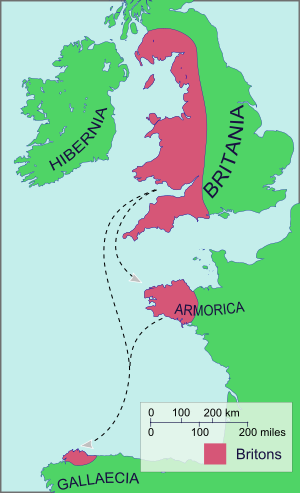
Back Britoniese tale Afrikaans Brythonisch ALS بريثونية Arabic لغات بريتونيه ARZ Llingües britóniques AST بریتونی دیللری AZB Britannische Sprochn BAR Брыцкія мовы BE-X-OLD Бритски езици Bulgarian ব্রিথনীয় ভাষাসমূহ Bengali/Bangla
| Brittonic | |
|---|---|
| *Brittonikā, Brythonic, British Celtic | |
| Geographic distribution | Wales, Cornwall, Brittany, in antiquity all of Great Britain and the Isle of Man, during the Early Middle Ages in Northern England and Southern Scotland and other western parts of Britain, Pictland, Galicia |
| Linguistic classification | Indo-European
|
| Proto-language | Common Brittonic |
| Subdivisions | |
| Glottolog | bryt1239 |
 The Brittonic-speaking community around the sixth century | |
The Brittonic languages (also Brythonic or British Celtic; Welsh: ieithoedd Brythonaidd/Prydeinig; Cornish: yethow brythonek/predennek; and Breton: yezhoù predenek) form one of the two branches of the Insular Celtic language family; the other is Goidelic.[1] It comprises the extant languages Breton, Cornish, and Welsh. The name Brythonic was derived by Welsh Celticist John Rhys from the Welsh word Brython, meaning Ancient Britons as opposed to an Anglo-Saxon or Gael.
The Brittonic languages derive from the Common Brittonic language, spoken throughout Great Britain during the Iron Age and Roman period. In the 5th and 6th centuries emigrating Britons also took Brittonic speech to the continent, most significantly in Brittany and Britonia. During the next few centuries, in much of Britain the language was replaced by Old English and Scottish Gaelic, with the remaining Common Brittonic language splitting into regional dialects, eventually evolving into Welsh, Cornish, Breton, Cumbric, and probably Pictish. Welsh and Breton continue to be spoken as native languages, while a revival in Cornish has led to an increase in speakers of that language. Cumbric and Pictish are extinct, having been replaced by Goidelic and Anglic speech. The Isle of Man and Orkney may also have originally spoken a Brittonic language, but this was later supplanted by Goidelic on the Isle of Man and Norse on Orkney. There is also a community of Brittonic language speakers in Y Wladfa (the Welsh settlement in Patagonia).
- ^ History of English: A Sketch of the Origin and Development of the English Language. Macmillan. 1893. Retrieved 7 July 2013 – via Internet Archive.
© MMXXIII Rich X Search. We shall prevail. All rights reserved. Rich X Search